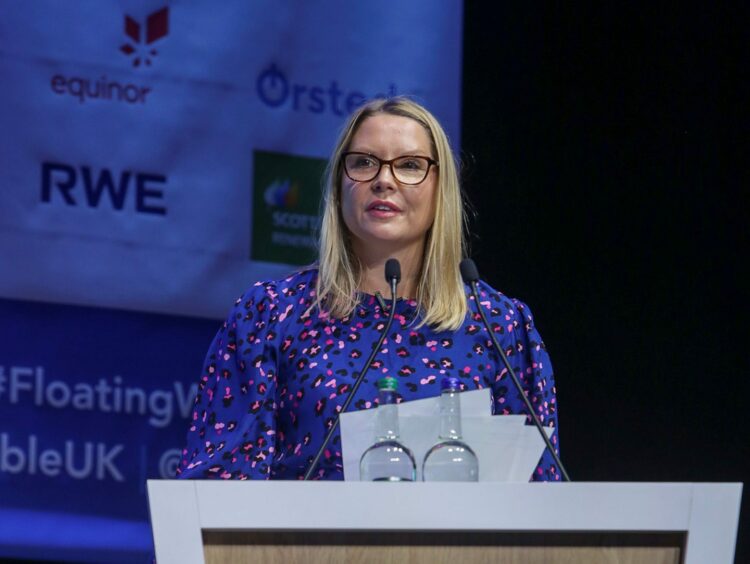
Scottish Renewables looks to bring government and industry together at a major offshore wind conference in Glasgow this week, with finance and consenting high on the agenda.
With over 1,100 delegates set to attend Scottish Renewables’ flagship offshore wind event in Glasgow on Wednesday, it’s a big week for the clean energy trade body – though as chief executive Claire Mack makes clear: “It’s a big week for Scotland as well.”
Speaking at the Port of Leith on Tuesday, where the organisation was co-hosting tours of Forth Ports’ growing renewables hub, Ms Mack said she was in a more optimistic frame of mind regarding the future of the sector after the upsets of 2023.
The failure of offshore wind to lodge any bids in the fifth Contracts for Difference round was noted as a particular low point.
“It’s no secret we’ve been on a kind of roller coaster, last year was an incredibly difficult year,” she said. “Incredibly difficult because we’re an industry that is very heavily reliant on signals as well, and when you see a signal like that it has an impact.”
But with action being taken at the political and sector level, a brighter picture is emerging for this year, and which will shape the two-day event.
Ms Mack noted a number of new problems and challenges requiring collaborative efforts, though her first priority is highlighting the financial opportunities for the sector are front and centre – “ensuring that the financial markets recognise that Scotland is the place for these projects, because we are able to manage them in the right way, and we’re able to create that really strong and dynamic pipeline.”
With national momentum building behind grid infrastructure, another priority will be grappling with the consenting process.
“That’s a really, really important one. We’ve got to make sure that we can develop these projects in the right way. We need to make sure we’ve got a consenting process which is robust but also accelerated at the same time,” she says.
“We’re managing to get turbines out there quicker and quicker, we’re getting better at the logistics, we’re getting better at the deployment – but actually being able to start work is the key place that that we need to really focus our efforts.”
Ministerial support
Those efforts have political backing, with Scottish First Minster Humza Yousaf scheduled to open the event’s plenary session. However, the trade body’s asks will extend beyond speeches.
“Having him with us tomorrow I’m really hoping to see more from him around how he wants to work with the UK government. Not just on the money, but on things like skills and consenting, which does sit very firmly with the Scottish Government but has to interact [nationally],” Ms Mack explained.
Asked recently what she would ask for from Cabinet Secretary for Energy, Neil Gray, after his appointment last year, Ms Mack ventured: “a public display of affection for the offshore sector”.
Reflecting on that this week, she said the government appears to have delivered, not least through commitments to offer up to £500 million to anchor a new offshore wind supply chain north of the border.
“I very much think we got that with the money that they’ve got available to them. That’s a big chunk and a big chunk of money to commit to industrial growth, and it’s really, great to see that and see that matched by the private sector.”
Added together with UK government commitments such as the Floating Offshore Wind Manufacturing Investment Scheme (FLOWMIS) – from which Scottish ports funding and manufacturing also hope to benefit – she suggests the sector has plenty to make it competitive with other markets.
Energy strategy delays
However, the trade body has criticised the harmful effects of a two-year wait for the Scottish Government’s energy strategy, which it says is putting billions of pounds of investment at risk.
A date for publication is now mooted for this summer, while civil servants pore over thousands of consultation responses.
Though the delay is unwelcome, Ms Mack says the important thing is getting the strategy right.
“While you would want to see it come quickly, you want it to be thoughtful. And that’s the point, the energy strategy has got to do a lot of different things, so we’ve given input into that.
“We’re really keen to see some milestones around about it so that we can make sure we know we’re on track.”
“We don’t want an energy strategy that will talk about 10 to 15 years away – what’s really important is what’s going to happen in the next three years, the next five years.”
Moreover, she made clear the importance of policy that begins to grapple with the whole energy system, encompassing not just generation, but also energy integration and use – taking into account the likes of green hydrogen, energy storage, and export opportunities.
With much of the country subject to an amber weather warning, national focus is certainly set to fall on wind. At the time of writing the event will be going ahead as planned, though rail transport has been affected by cancellations.
Scottish Renewables said delegates should plan their route in advance, make plenty of extra time and consider alternative travel options.
Recommended for you
